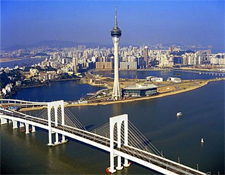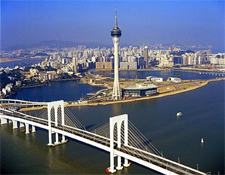
 With the economy still lukewarm at home, intrepid types are looking further afield for their paydays. Last year, China’s economy grew by almost 10%. It also replaced Japan as the world’s second largest economy. The demand for skills and management experience is creating jobs for Americans in the East. Living and working in China is certainly the ultimate way to experience this fast changing country; and of course it looks great on a resume. But more importantly, working in China offers a fresh start; a way out of the professional or personal rut you may be in.
With the economy still lukewarm at home, intrepid types are looking further afield for their paydays. Last year, China’s economy grew by almost 10%. It also replaced Japan as the world’s second largest economy. The demand for skills and management experience is creating jobs for Americans in the East. Living and working in China is certainly the ultimate way to experience this fast changing country; and of course it looks great on a resume. But more importantly, working in China offers a fresh start; a way out of the professional or personal rut you may be in.
If you’ve got what it takes, the adventure of living and working in China can be yours. Finding the job and sorting out the visa is not as difficult as it once was. International recruitment companies are scouring the globe for the best and the brightest, and visa application services take all the stress out of getting work permits. However, the transition from the West to East is not an easy one. Many expatriates find the cultural divide too great to overcome; quit their jobs abroad and move home. But this does not have to be your fate. If you know what to expect from Chinese culture, and how it plays out in Chinese workplaces, then your transition to your new life in China will be a smoother one.
- Your new Chinese colleagues may be quite cold towards you – at first.
Know that their aloofness has nothing to do with you but rather with a fear that all Chinese have: ‘losing face’. The concept of ‘face’ is central to Chinese culture. People in Asia actively avoid situations that could cause them public embarrassment. A new colleague of yours may be avoiding you because they think their English isn’t very good and that you will think less of them for it. The only way the ice is going to be broken here is if you make the first move and introduce yourself in Mandarin. Now, your Mandarin may be worse than their English, but by ‘giving face’ – saving them from what they perceive to be an embarrassing situation – you will be well on your way to making a new friend, and ally, at work. Most jobs for Westerners don’t require them to speak Mandarin fluently, but a working knowledge of the language will help you feel less isolated in your new job.
- Nobody seems to be able to say what they mean.
China’s collectivist culture puts harmonious relationships ahead of profits, efficiency and deadlines. Chinese supervisors are deliberately vague when it comes to correcting a subordinate. They want to make sure that no one ‘loses face’. In the West we expect colleagues and supervisors to be straightforward with us. In China, you should expect your boss to drop hints like they’re hot and to politely dance around the issues. If you suspect your supervisor is walking on egg shells around you, then you may have to actually give your boss permission to criticize you privately. Assure them that it won’t jeopardize your relationship. A straightforward chitchat though is often anything but. In China many things are left unsaid. Sometimes ‘maybe’ is a ‘no’ and a ‘yes’ could mean: ‘over my dead body’. If you ask your boss for the day off and he says ‘yes’, wait a few minutes to see what he does next. If he goes to his office and sends you an email inviting you to a meeting on that day, his actions are saying: ‘no’; you don’t have that day off. In China actions always speak louder than words.
- It’s difficult to get an honest opinion out of anyone.
In China, everyone has their place, and they all appear quite happy to occupy their particular rung on China’s cultural ladder. This hierarchy exists everywhere: from family, to communities, to workplaces. Most Chinese believe that their status in their community, or their workplace, does not afford them the authority to offer up an opinion. Don’t expect any original and out of the box thinking. You will rarely get to hear opinions that deviate from the party line. Ask a Beijing resident what is her take on Beijing’s notorious smog, and she may reply: ‘What smog? It’s just an overcast day.’ You should be careful with being free with your own opinions. Avoid discussing the trifecta: Taiwanese separatism, the occupation of Tibet and the 1989 massacre in Tiananmen Square. Know that the Chinese don’t see themselves as apart from their country and the policies of their government. To criticize China in mixed company can be the equivalent of criticizing a colleague in front of their peers.
- If you’re waiting for praise from your boss – you’re going wait a long time.
In the West we celebrate our winners, but in Eastern cultures overachievers pose a problem. In China to give someone public recognition is cause for the others to ‘lose face’. Expect not to be praised publically by your supervisor. The Chinese never want to appear boastful. If you are the manager don’t embarrass a subordinate by congratulating them in front of their peers. Now, if a Chinese colleague comments on how thin you are, don’t necessarily take it as a compliment. The Chinese have a very casual way of talking about physical appearances. They could have easily remarked on your height, your age or your weight. Westerners find this cultural quirk particularly offensive. But the Chinese are just stating facts as they see them. They do not necessarily attach the same negative connotations as we do to weight, height or age. It is not their intention to have you ‘lose face’.
If you can appreciate the importance of ‘saving face’ to the Chinese and you look for opportunities to ‘give face’ to your colleagues, then you will not only survive, but thrive in your new life in China.
Leave a Reply